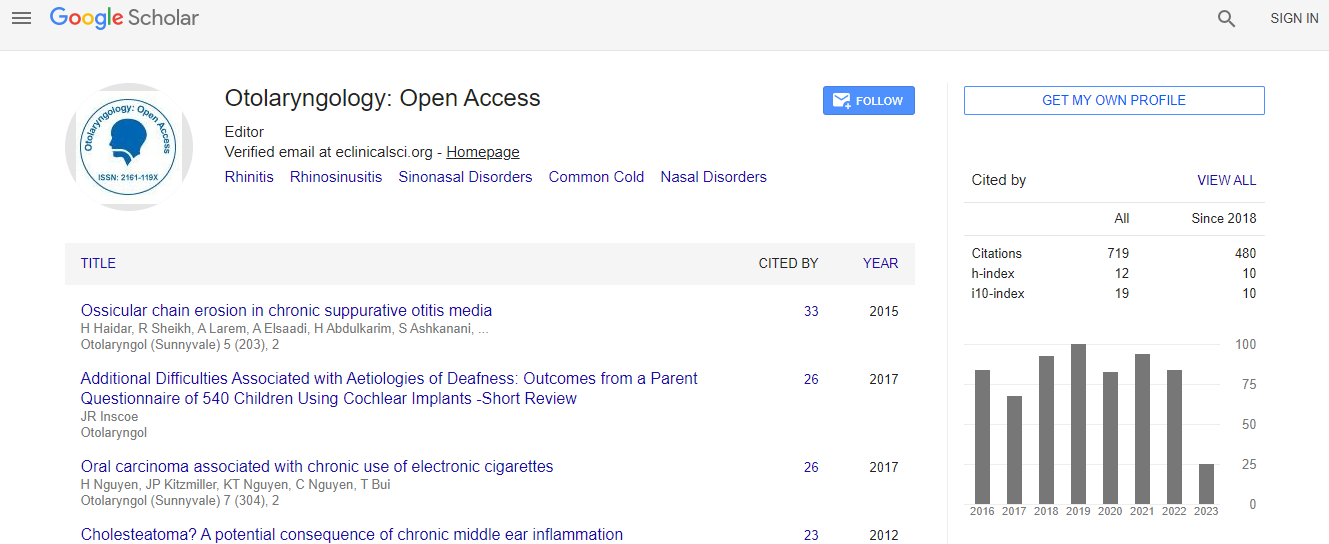Our Group organises 3000+ Global Conferenceseries Events every year across USA, Europe & Asia with support from 1000 more scientific Societies and Publishes 700+ Open Access Journals which contains over 50000 eminent personalities, reputed scientists as editorial board members.
Open Access Journals gaining more Readers and Citations
700 Journals and 15,000,000 Readers Each Journal is getting 25,000+ Readers
Google Scholar citation report
Citations : 925
Otolaryngology: Open Access received 925 citations as per Google Scholar report
Otolaryngology: Open Access peer review process verified at publons
Indexed In
- Index Copernicus
- Google Scholar
- Sherpa Romeo
- Open J Gate
- Genamics JournalSeek
- RefSeek
- Hamdard University
- EBSCO A-Z
- OCLC- WorldCat
- Publons
- Geneva Foundation for Medical Education and Research
- ICMJE
Useful Links
Recommended Journals
Related Subjects
Share This Page
Failure of cochlear implant device in postoperative period: Our experience
3rd International Conference and Exhibition on Rhinology & Otology
Simple Patadia
Sanjay Gandhi Post Graduate Institute of Medical Sciences, India
ScientificTracks Abstracts: Otolaryngology
Abstract
Introduction: Cochlear implants are one of the most successful implants in the world. However, any implantation surgery is prone to considerable risk of failure (4-8% in literature). Our experience in dealing failure of cochlear implant devices is shared in this paper. Materials & Methods: A retrospective study of 250 patients (201 children, 41 adults), with normal cochlea, at a tertiary care center, from June 2004 to June 2014, was done. All cases were implanted multichannel devices via Veria technique of cochlear implant surgery. Preoperative assessment, surgical considerations and postoperative audio-logical outcomes were analyzed. Preoperative and postoperative audio-logical outcomes were analyzed using Category of Auditory Perception (CAP) Score and Speech Intelligibility Rating (SIR) Score Results: Rate of re-implantation was 2.8%. The causes of revision cochlear implant surgery were hard device failure (n=3), surgical complications (n=2), magnet displacement (n=2), soft failure (n=1), electrode extrusion (n=1). In one patient, recurrent cutaneous infection on the implanted site ultimately resulted in re-implantation in the opposite ear, after multiple surgical interventions on the same side. The preoperative and postoperative CAP and SIR score showed significant improvement in postoperative period with p<0.05 as compared with paired t test. Conclusions: Preoperative counseling for device failure should always be emphasized. There is a high surgical success rate in RCI with preservation or improvement in preoperative auditory performance.Biography
Simple Patadia completed her MBBS (2010) and MS ENT (2013) from the reputed BJ Medical College, Ahmedabad (registered under Dr. Rajesh Vishwakarma). She joined her senior residency in Neuro-otology in the department of Neuro-surgery at Sanjay Gandhi Post Graduate Institute of Medical Sciences in Jan 2014. She has special interest in Neuro-otology and Endoscopic Skull Base Surgery and has presented many papers in national conferences.
Email: simplepatadia@gmail.com

 Spanish
Spanish  Chinese
Chinese  Russian
Russian  German
German  French
French  Japanese
Japanese  Portuguese
Portuguese  Hindi
Hindi 
